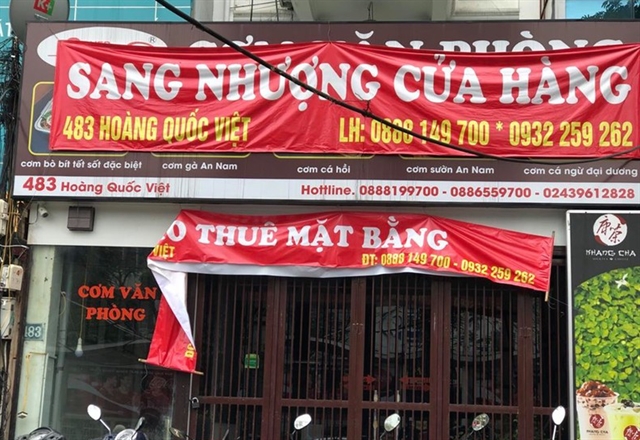 Economy
Economy


|
| A restaurant on Hoàng Quốc Việt Street puts a 'for sale' sign up after business declined. — Photo Infonet |
By Minh Hương
HÀ NỘI — The usually crowded Ngũ Xã Street in Hà Nội stands empty. The area, famous for phở cuốn (rice noodle roll), has suffered a severe drop in visitors after COVID-19 cases were confirmed nearby.
Đinh Thanh Mai, 40, owner of a phở cuốn restaurant on the street, tells Việt Nam News: "I have paid six months of rent in advance, at VNĐ30 million per month. I have not received a lot of customers since after Tết (Lunar New Year), but I have to keep the restaurant open so I can earn something to make up for it.”
Mai had to lay off more than half her staff and take on her two kids part-time, but the situation got worse after the March 6, when the Hà Nội’s first case of COVID-19 was reported in nearby Trúc Bạch Street.
"There were people who wanted to purchase my shop, as they saw how busy it was here. Now of course, they ran far away," said the woman
Empty restaurants have made it difficult for tenants. Those on short term contracts have left their properties, leaving landlords with the challenge.
Nguyễn Thị Bích, 65, has a house on Đội Cấn Street where she rents out the first floor as commercial space. For the last two months, she has been unable to find tenants.
“I have never been in this situation before,” Bích told Việt Nam News. “I have a house in one of the best spots for business, but no one wants to rent it now.”
According to the director of the General Statistics Office (GSO) Nguyễn Bích Lâm, there are more than 5.6 million individual business households like Mai and Bích in Việt Nam.
Even though the number of household businesses in Việt Nam is eight times larger than the total number of enterprises, representing 30 per cent of GDP, the small scale of the businesses means they are unable to receive support like loan and tax policies during this difficult time.
Knowing there is no help for the unexpected situation, landlords and tenants are working together to help each other.
Nguyễn Mỹ Hạnh, owner of May10 Fashion on Đội Cấn Street, asked her landlord for a 20 per cent reduction in rent.
Hạnh’s landlord agreed with the proposal. The woman told Việt Nam News: “There is no other choice. If I don’t, she cannot afford to stay here. And if she goes, I don’t think I could find a tenant during the pandemic.”
Lê Hà Phương, 32, who owns a coffee shop on Vĩnh Phúc Street is also hoping her landlord lowers the rent or she will have to move.
“I cannot continue paying VNĐ20 million per month while I earn so much less. I want to keep the business and wait for things to improve, but to do that I need a lower rent.”
Most businesses on the busy streets of Kim Mã, Xã Đàn, Hoàng Cầu and Kim Liên, as well as many areas in the Old Quarter, think negotiating lower rents is the only way to reduce losses in such a pandemic.
As Mai on Ngũ Xã paid her rent upfront for the next six months, the store owner just wishes the pandemic will soon be over and her business can resume normal operations. She told Việt Nam News: “I want the weather to get hotter as they said the virus can’t survive in hot weather.” — VNS









